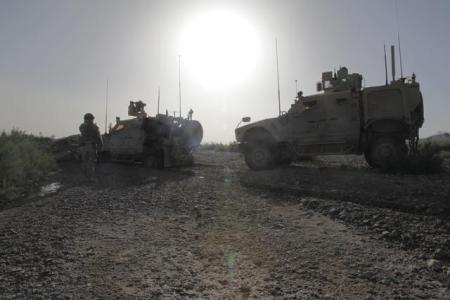
Stuck in Afghanistan: Soldiers try to free a U.S. Army vehicle mired in Kandahar Province / Army photo by Alicia Brand
A senior White House official was eager Thursday night to hear from a reporter on just how President Obama’s decision to pull 10,000 troops out of Afghanistan by year’s end was playing. “How do you think he did?” he asked at the fringe of Pakistani ambassador Husain Haqanni’s annual barbeque. “Well, Mullen and Petraeus were pretty straight-forward in saying they would have preferred a slower pullout,” the scribe responded, referring to congressional testimony Thursday from Adm. Mike Mullen, chairman of the Joint Chiefs of Staff, and Army General Dave Petraeus, who is running the war.
“Yea, but the President selected an option that Gates backed,” the top White House aide noted.
“So how come Mullen said `the President’s decisions are more aggressive and incur more risk than I was originally prepared to accept,’?” the reporter asked. “What happened to that `originally’?”
“That’s how Mullen felt before Gates made up his mind,” the White House heavyweight said without hesitation. “Once he saw where Gates was coming down, Mullen was willing to accept more risk.”
That’s what’s politely called “civilian control of the military” in civics class.


